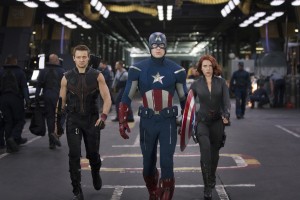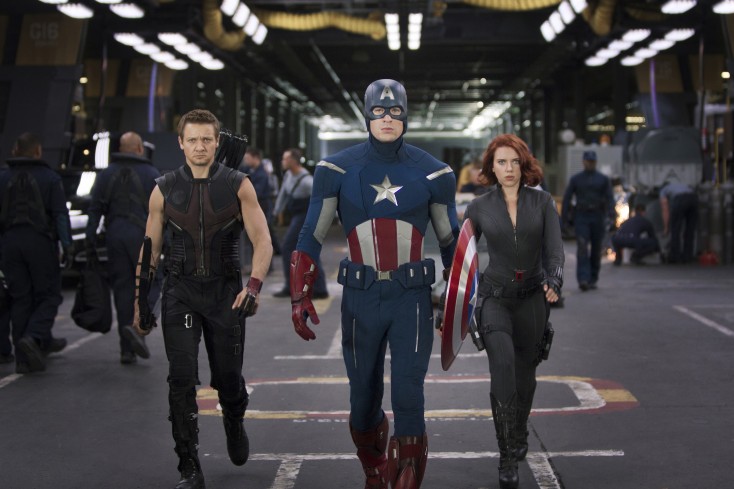
(l-r) Hawkeye (Jeremy Renner), Captain America (Chris Evans) & Black Widow (Scarlett Johansson) in "Marvel's The Avengers" © 2011 MVLFFLLC. TM & © 2011 Marvel. CR: Zade Rosenthal.
By ANGELA DAWSON
Front Row Features
HOLLYWOOD—Oscar and Emmy nominee Joss Whedon turned “Buffy the Vampire Slayer” and “Angel” into pop culture phenomena, so who else but the imaginative fantasy expert could be tasked with bringing the biggest superheroes of the Marvel Comics universe together in “The Avengers,” a star-studded cinematic extravaganza?
Whedon eagerly accepted the challenge of bringing together Iron Man (Robert Downey Jr.), Thor (Chris Hemsworth), Captain America (Chris Evans), the Hulk (Mark Ruffalo), and a handful of new and ancillary Marvel characters for one big action adventure. He wrote the screenplay with Zak Penn, and directs the film based on characters created by Stan Lee and Jack Kirby, in which the superheroes are brought together by the S.H.I.E.L.D. spy organization’s Nick Fury (Samuel L. Jackson) to fight against Thor’s evil brother Loki (Tom Hiddleston), a banished god seeking to conquer Earth with an army of aliens. Hawkeye (Jeremy Renner) and Black Widow (Scarlett Johansson) join the superheroes in their planet-saving effort.
Whedon, 47, recently explained what motivated him to accept the challenge and what it was like directing what is expected to be one of the biggest—if not the biggest—Hollywood action movies of the year.
Front Row Features: What was the biggest challenge for you in bringing all these superheroes from the other films together?
Joss Whedon: It was kind of a no-brainer. The hardest part is and always will be structure. How do you put it together? How do you make everybody shine? How do you let the audience’s identification drift from person to person and feel like their involved. It’s a very complex structure. It’s not necessarily ornate or original, but it had to be right. It had to be earned, and that’s exhausting.
Front Row Features: What separates a good comic book adaptation film from a bad comic book adaptation film?
Whedon: There are all sorts, but for me, it’s capturing the essence of the comic and being true to what’s wonderful about it, while remembering that (I’m making) a movie and not a comic book.
Front Row Features: When did it hit you that you were making “The Avengers?”
Whedon: People kept asking me, “Are you excited that you’re directing this movie?” and I kept saying, “I will be.” I think it hit me when we were in the lab where almost all of the Avengers get together for the first time and, I was giving Chris Evans a piece of direction and I walked into the hall and I stopped and I just said to the producers, “it happened,” the moment just sort of flooded over me and I was like “oh, that’s nice.” That was it.
Front Row Features: You’ve done movies with big ensemble casts before, like the sci-fi epic “Serenity.” You had to introduce characters in that. Did you learn from that experience and how did you go about introducing the new cast members like Cobie Smulders who plays Agent Hill in this?
Whedon: It’s the same problem I had with “Serenity” and swore I’d never have again. Tracking the information you have to get across in the movie is more difficult because it’s not as much fun as tracking the emotion of the thing. You have to know how much people need to know, because some audiences come in knowing everything, and you don’t want to tell them too much, and some of them will come in knowing nothing (about the previous Marvel films) and you don’t want to tell them too much. You want some things to be inferred. It’s fun to see a movie that has texture beyond what you know. If you feel there’s a life outside the frame, then you feel good about it. You don’t necessarily have to lay everything out. Organizing was the most exhausting part of the film because it wasn’t all there. The stuff between the characters, that’s just candy.
Front Row Features: What was the biggest challenge of bringing these disparate characters together?
Whedon: It’s enormously difficult to take these characters and make them work. Marvel really cracked the code in terms of “oh, they’re just like us.” Marvel really started with “Iron Man.” You need to use that as your base.
Front Row Features: What is your approach to spectacle in the film?
Whedon: My approach to spectacle was kind of wrong-headed, but the most important thing was not to have the spectacle for its own sake. It had to be earned and it had to be believable. It also had to be understandable visually, that you knew exactly where things were, what was at stake, who had to get where from where and how, and what was in their way. I tend to be very pedantic about that. I don’t just want a blur of things crashing around. I want to know how everybody’s doing.
Front Row Features: Were there any stumbling blocks to that approach?
Whedon: Sometimes I would try to obey the laws of physics, and that would actually just make for weaker footage, and eventually I just had to give up and realize that every time a car is hit by anything, it blows up and flips over. A hamster could hit it and bam.
Front Row Features: Could you say which alien race it was that Loki (Hiddleston) was working with in the film?
Whedon: The alien race are the Chitauri or a version of them, because they are not one of the key races and they don’t have a story or history, but that wasn’t the point. I know this debate will go on long after I am dead, so I’ll just say it was the Kree-Skrull race, and really make everybody angry.
Front Row Features: How did you decide which secondary characters from the other Marvel superhero films, such as Pepper Potts from “Iron Man,” to incorporate into “The Avengers?”
Whedon: My first instinct was not to have anybody from any of (the previous films), partially because you need to separate the characters from their support systems in order to create the isolation that you need for a team, and put them in a new environment. I also wanted to make it possible, when they go back to their own movies, they’d have something “The Avengers” didn’t have, and I wasn’t sort of sucking the juice out of all the sequels that are going to be coming up. Bringing in Pepper (Gwyneth Paltrow) was really Robert’s thing. He pushed hard. He didn’t want to be this crazy, alone guy; he wanted to be crazy in a relationship guy, and he really thought Gwyneth would bring something great to the table. We all thought so as well, but he’s the one that convinced her to come and do it.
Front Row Features: In retrospect, did that make sense story-wise?
Whedon: It makes sense because (his Downey’s character, Tony Stark) has been through two movies and he’s had more of a journey and he is in more of a stable place, but he can still be that and be completely isolated from the world in his giant tower that he built.
Front Row Features: There’s an interesting balance between the action, characters and the conflicts these superheroes have, such as Iron Man rejecting the soldier mentality of Captain America. Does it reflect your own ideology?
Whedon: you have to write something you believe in. Captain America was kind of my Ground Zero for this film. The idea of someone who had been in World War II, had seen people laying down their lives in the worst kinds of circumstances in a world where the idea of community and the idea of a man being part of something, as opposed to being isolated from or bigger than the whole, is a very different concept of manhood. The idea of the soldier, the person who is willing to lay down his life, is very different than the idea of the superhero.
Front Row Features: How would you describe “The Avengers” genre?
Whedon: From the start, I wanted to make a war movie. I wanted to put these guys through more than what they would be put through in a normal superhero movie. It was very important for me to build that concept and have Tony (Downey) reject that concept on every level, so that when he ultimately is willing to lay himself down on the line, you get where’s he’s come from, and how Steve (Evans) has affected him.





